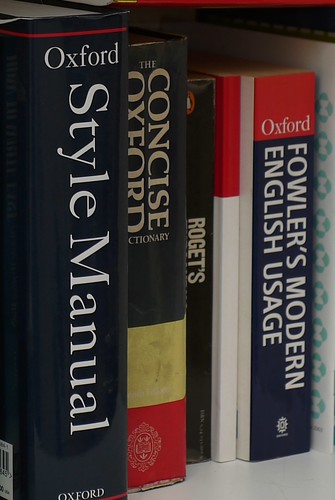A couple of years ago I wrote an article called Some of my reference books, which described some of the reference books I use, and why. Two years on, I thought it would be interesting to revisit this subject, but in a little more depth.
 A part of my Writer's Reference Toolkit
A part of my Writer's Reference Toolkit
I think of my selection of reference books as my toolkit. In this first article in this new series, I try to answer the question: why would a writer need a reference toolkit?
I think the short answer is that it’s a matter of professionalism. If you take pride in your writing, and you’re keen to do the best job you possibly can, and especially if you hope to earn money from your writing, you need a proper set of tools.
A short while ago we watched someone doing some gardening. The only gardening implement this person had was an electric saw, which he applied to everything. We couldn’t believe our eyes!
A real gardener would, obviously, have a selection of tools in order to use the most appropriate one at any given time. Any writer worthy of the name would do likewise.
The term “toolkit” is a good one I think. A selection of reference works, as opposed to a single one, is essential. There are three reasons for this.
First, depending on what you want to find out or clarify, you will need a variety of sources: dictionary, thesaurus, book of quotations and so on.
Second, rather disconcertingly, different reference works do not always agree with each other. This is especially true of books dealing with English usage. Some time ago, for example, I wanted a definitive answer on whether to use “different to” or “different from”. I didn’t get one. I checked four or five different reference works, and they each said something slightly different. All you can do in such a case is to use the advice which comes up most often (although the advice was different in each case, there was some overlap). Or use the advice which most suits the context in which you are using the word or phrase in question. The point is, you cannot rely on one reference work alone, no matter how authoritative it may be: you have to apply some judgement of your own.
Third, I think it is a matter of security, psychologically speaking. If two or three reference works all say something similar about how a word or phrase should be used, or how it is defined, then one can feel more confident that one has used it properly. Sometimes it is necessary to have the backing of “authority” -- especially when using a word in a way that is out of line with the way most people do so!
In the next article, I’ll be looking at what a Writer’s Reference Toolkit should comprise in my opinion.